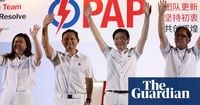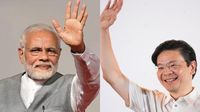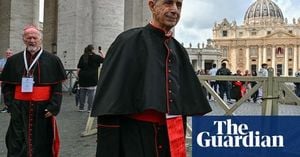Singapore's long-ruling People's Action Party (PAP) has secured a decisive victory in the general elections held on May 3, 2025, reaffirming its dominance in the city-state's political landscape. This election marks the PAP's 14th consecutive electoral win, extending its 66-year unbroken rule and providing a significant boost to Prime Minister Lawrence Wong, who took office just a year ago.
The Election Department reported that the PAP won 87 out of 97 parliamentary seats, with a popular vote of 65.6%, a notable increase from 61.2% in the 2020 elections. The opposition Workers' Party (WP) managed to maintain its presence in Parliament, holding onto its 10 seats amidst a backdrop of rising political tensions and economic challenges.
Wong, who succeeded Lee Hsien Loong in May 2024, expressed his gratitude for the solid mandate from voters, stating, "I am deeply humbled and grateful for the results. The results will put Singapore in a better position to face this turbulent world." He acknowledged the voters' desire for more alternative voices in government but emphasized the need for a strong PAP team to navigate the challenges ahead, particularly in light of global economic uncertainties.
The election took place against a backdrop of economic headwinds, including the impact of tariffs imposed by U.S. President Donald Trump, which have raised concerns about Singapore's trade-dependent economy. Wong noted that the results would empower his government to push forward with necessary economic reforms and social support measures. "It is a changed world – not just an economic slowdown, but fundamental shifts in the international order," he remarked.
Prime Minister Narendra Modi of India was among the first world leaders to congratulate Wong on his electoral success, highlighting the strong partnership between India and Singapore. "Heartiest congratulations @LawrenceWongST on your resounding victory in the general elections. I look forward to working closely with you to further advance our multifaceted partnership," Modi posted on X.
Despite the PAP's overwhelming victory, analysts noted that the Workers' Party has solidified its position as the main opposition party. Political analyst Bridget Welsh commented, "The Workers' Party has pulled ahead of other parties, though a sustained challenge to the PAP remains distant. Voters opted for stability amid concerns over global volatility due to sweeping U.S. tariffs." WP leader Pritam Singh acknowledged the tough contest and vowed to continue fighting for a more balanced Parliament, stating, "The slate is wiped clean; we start work again tomorrow, and we go again."
The election saw a record voter turnout of over 2.4 million, with Singaporeans casting their ballots at 1,240 polling stations. The PAP contested all 92 constituencies, while the Workers' Party ran in eight, along with other smaller opposition parties like the Progress Singapore Party (PSP) and Singapore Democratic Party (SDP). The PAP's victory included five seats won uncontested on Nomination Day, April 23, 2025.
Wong's leadership style has been characterized as more approachable, particularly in engaging younger voters. His efforts to renew the PAP by bringing in new faces have also been credited with helping to swing votes in favor of the party. This election was Wong's first major test as prime minister, and he successfully improved the PAP's vote share, a feat not achieved by previous leaders during their inaugural elections.
However, the PAP's dominance has faced increasing scrutiny from a more vocal electorate. Issues such as the rising cost of living, widening income disparity, and restrictions on free speech have led to growing discontent, particularly among younger voters. Critics argue that gerrymandering has given the PAP an advantage, making it difficult for opposition parties to gain ground.
In his post-election remarks, Wong emphasized the importance of addressing these pressing issues. "We have been working on these issues, and I assure you, we will redouble our efforts in the coming term to tackle these issues of concern," he stated, acknowledging the feedback received from Singaporeans during the campaign.
The PAP's long-standing rule has been marked by stability and economic growth, but recent controversies, including the imprisonment of former transport minister S Iswaran for corruption and ongoing family disputes within the Lee political dynasty, have raised questions about the party's future. Despite these challenges, Wong's administration is poised to navigate the complexities of both domestic and international landscapes.
As Singapore moves forward, the results of this election signal a clear mandate for Wong and the PAP to continue their governance while also addressing the demands for greater political representation and accountability. The coming months will be crucial as Wong forms his Cabinet and implements policies aimed at bolstering Singapore's economy in an increasingly uncertain global environment.
In conclusion, the PAP's resounding victory not only reinforces its long-standing position in Singapore's political arena but also underscores the need for the government to remain responsive to the evolving concerns of its citizens. The balance between stability and the demand for more diverse political representation will be a critical focus as Wong leads the nation into the future.





